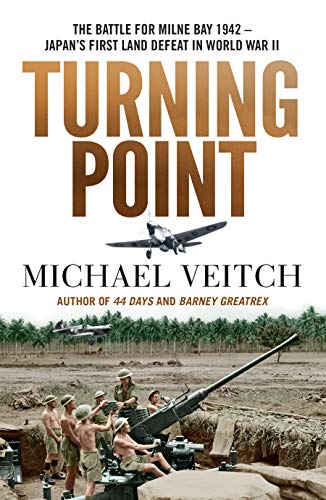What do you think?
Rate this book


The Battle for Milne Bay - Japan's first defeat on land in the Second World War - was a defining moment in the evolution of the indomitable Australian fighting spirit. For the men of the AIF, the militia and the RAAF, it was the turning point in the Pacific, and their finest - though now largely forgotten - hour. Forgotten, until now.
In August 1942, Japan's forces were unstoppable. Having conquered vast swathes of south-east Asia - Malaya, Singapore, the Dutch East Indies - and now invading New Guinea, many feared the Empire of the Rising Sun stood poised to knock down Australia's northern door.
But first they needed Port Moresby. In the still of an August night, Japanese marines sailed quietly into Milne Bay, a long, malaria-ridden dead end at the far eastern tip of Papua, to unleash an audacious pincer movement. Unbeknown to them, however, a secret airstrip had been carved out of a coconut plantation by US Engineers, and a garrison of Australian troops had been established, supported by two locally based squadrons of RAAF Kittyhawks, including the men of the famed 75 Squadron. The scene was set for one of the most decisive and vicious battles of the war.
For ten days and nights Australia's soldiers and airmen fought the elite of Japan's forces along a sodden jungle track, and forced them back step by muddy, bloody step.
In Turning Point, bestselling author Michael Veitch brings to life the incredible exploits and tragic sacrifices of these Australian heroes.
301 pages, Kindle Edition
Published July 23, 2019
Milne Bay drew the curtain on the series of disasters that had befallen the Allied forces in Malaya, Rabaul, Timor, Ambon and Singapore, where men were sacrificed in the blind hope that penny packets could succeed where entire battalions had failed. It was the moment that halted the dangerous belief, which was beginning to take hold, that Australians simply could not overcome the Japanese.
For the last week, Clowes had endured rising criticism from generals MacArthur and Blamey and, less directly, the Deputy Chief of the General Staff, George Vasey, over his management of the battle. Vasey’s letters and directives of the time are illustrative, revealing a man unsuccessfully trying to steer a path between conflicting egos and vastly different approaches to the conduct of the war. ‘I’m afraid the last week was a trying time for many of us,’ he confided in a note to Sydney Rowell in Port Moresby. ‘GHQ [i.e. MacArthur’s HQ] is like a bloody barometer in a cyclone. Up and down every two minutes!’ Vasey explained that, in the eyes of the man he obliquely referred to as ‘the Great’, meaning MacArthur, Clowes had committed the unforgivable sin of not carrying out their hastily issued directive of ‘Clearing the Northern shore of Milne Bay’ by moving against the Japanese immediately, and with everything he had, following their landing. Clowes had then exacerbated GHQ’s petulant frustration by denying their demands, issued several times daily, for blow-by-blow descriptions of his progress. In this, Vasey conceded his own annoyance: ‘I am more convinced than ever that our reports need to be written in Americanese. They don’t understand our restrained English …’
Small in comparison to some of the sustained and desperate fighting which took place in the Pacific … yet it was the first Australian victory against the Japanese invader, and brought to a halt the long series of territorial gains which the enemy had seemed to achieve with relative ease. Henceforth the tide was destined to turn. None of this, however, washed with General MacArthur. On 6 September, even after the Japanese had evacuated the remnants of their shattered force, MacArthur wrote to his superior, General George Marshall, in Washington: The Australians have proven themselves unable to match the enemy in jungle fighting. Aggressive leadership is lacking. The enemy’s defeat at Milne Bay must not be accepted as a measure of relative fighting capacity of the troops involved. MacArthur was never convinced of the Australians’ fighting ability, becoming renowned thereafter for issuing press releases describing their setbacks and defeats as Australian, but their victories as Allied.